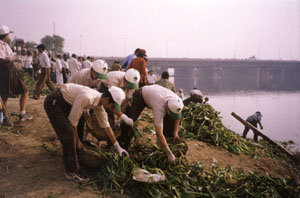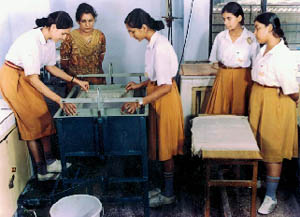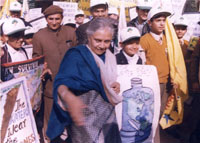|
CLEAN-India: Crusade
for a Greener World CLEAN-India Team cleanindia@sdalt.ernet.in The challenge of modern society is how to live comfortably today, without messing with the planet and with our future. Getting a bumper crop today by exhausting the fertility of the soil is not sustainable development. Sustainable Development means meeting the needs of today without destroying the planet’s capacity to meet the needs of future generations. The cost estimates for environ-mental degradation in India are mind boggling. Every year, more than US $13 billion (6% GDP) alone are paid as environmental costs. People all over the planet have started realising that the quality of life today is no more a question of choice between development and environment or between technology and ecology. We in India, must understand that "the problems of the environment can only be solved within the process of development". The growing population with its ever increasing needs is often considered to be the reason for the mismatch between the availability of natural resources and the number of people that are sharing them. This situation is further aggravated when even a section of the population adopts unsustainable production and consumption practices. The future is bleak if we continue with the business as usual. As we interact with nature, we often tend to neglect some of the significant implications, may be not just out of mere carelessness but due to lack of knowledge, attitudes and value systems. Fortunately, people all around the world are becoming more aware of their environment than ever before. However, mere awareness may just make us more intelligent but not necessarily committed or accountable. But, in this age of cost-conscious society where the science of economics is ruling the world, we are left with no choice but to ‘act’.
The choice is not a difficult one. We do not have to destroy forests to have paper. If managed properly, we can have both. We need not poison our resources before we even put them to use. A little care, common sense and preventive management is all that is required. But whose care and whose common sense is accountable? ..... The answer is each one of us! Each individual is accountable, each household is accountable, each community is accountable, each Government, organisation and industry is accountable. We have to give up our conventional thinking that only industries require environmental management tools and practices. It is our job to influence the behaviour of our industries, our Governments, our neighbours and our own selves. What is required is a firm resolve to plan and organise our efforts to develop and protect the environment on a comprehensive, integrated basis, in order to satisfy the basic needs, improve living conditions and to ensure the rational management of resources and the environment. We can shape our future by choosing the right alternatives, policies and institutions through the sense of collective responsibility. People’s access to natural resources can be achieved by emphasising efficiency in resource use, besides minimising the damage to our environment. Where better to ingrain the concept of environment protection and improvement than in children who are shaping their own future by their daily actions. Young children are receptive and curious about the world, making this an appealing group to motivate to take action for environmental conservation. They are also our future decision makers and leaders and it is best to "catch them young". With the mission to groom environmentally sensitive young citizens, DA embarked upon the CLEAN-India programme (Community Led Environment Action Network) in 1996. Now a nation-wide programme, CLEAN-India works with school children and communities to create environmental awareness and undertake environment improvement actions. The underlying realisation is that " each one of us is responsible for the current state of environment in the country, and we can not wait for someone else to solve it ". The "CLEAN - India" programme instills a sense of responsibility in every individual. The approach the programme adopts is to provide opportunities to students and communities to understand and learn more about the quality of the environment and use their findings to create or demand solutions. The communities are thus empowered to make right choices and decisions in the interest of the larger population. While children trigger the whole process, they are joined by elders in taking up initiatives to preserve and enhance the quality of environment. Since it was initiated , CLEAN-India has already started reaping the fruits of collective action. To enable students explore the wide gamut of environmental areas and concerns, CLEAN-India programme has undertaken a number of activities and projects with them. This way each school with CLEAN is also moving towards becoming an eco-friendly school.
The water monitoring or the " Water Watch " programme which has been a major thrust area of CLEAN-India has grown in leaps and bounds with the student army diligently taking up the task of assessing the drinking water quality, making people aware of the quality of water they drink and instigating them to take suitable remedial measures. Whether it is the simple act of boiling or chlorinating water or even installing community based water filters, people who have interacted with the young CLEAN scientists are now relating water to health and taking remedial and preventive measures. For example, in Kodaikanal and Shillong, the waterwatch project is already making strides by restoring the local lakes and streams. In Delhi, the intensive database on water quality is now available as an interactive digital water map, where anyone can find the quality of water in an area at the click of a mouse. But what is most encouraging is perhaps to witness that many students have realised the true value of clean water, leading to small steps towards its conservation in personal life and even water harvesting at school level. Similarly, the air watch programme is also underway and will soon be as intensive as the water monitoring programme. With air pollution becoming a common bane of most Indian cities, it is imperative that people are educated about its causes and impacts. The impact on the students is great when they assess the deteriorating quality of air themselves. The concerned students have also taken initiatives such as taking the pledge not to burst crackers, sharing their vehicles and even planting trees. Tree planting has also shaped into a major activity, with all CLEAN-India centres aggressively planting saplings in schools and other areas with the motto : "Wherever there is an open area, let us make it green." The emphasis is on planting a variety of native species and creating a mini-arboretum of sorts so that the students are acquainted with diversity in nature. The emphasis extends beyond the act of tree plantation’ with the students being taught how to take care of trees and nurture them. The efforts do not stop at planting but they also take due after-care. Many have realised that saplings do not turn into trees overnight, but need sustained care and protection in the initial years. Many areas that have turned greener today are a proof that even students can be responsive and responsible towards environment. Tree planting has also led the students to value and appreciate the existing trees. In Delhi, they have vigorously campaigned and saved many roadside trees from threats due to tiling, tarring or nailing of advertisements.
The campaign for celebrating an eco-friendly Diwali too has extended to celebrating other festivals in an environment-friendly way. All religions are closely intertwined with nature, and in India many celebrate its beauty through festivals and other rituals. But over time, we have somehow lost the true essence of our festivals and our ways of celebrating festivals actually harm the environment rather then benefit it. The campaigns spearheaded on eco-festivals now actually have children changing the ways their parents have (for years) been celebrating festivals like Holi, Diwali, Durga Puja by using natural colours for Holi and unbaked clay idols for immersion. Once the students are convinced about the issues, they actively and aggressively campaign to further spread awareness in their respective schools, neighbouring communities and even the schools nearby. Whether the medium is creative street plays, public hearings, rallies, door to door signature campaigns, exhibitions or competitions, CLEAN students have been highly successful in spreading the message to more and more number of people. It is aptly said that " the child is the father of man " and thus a powerful agent of education. They have made their voices heard, anxieties understood and concerns translated into action for a cleaner environment. They have proved that as future citizens they can shoulder the responsibility of bringing about a positive change.
Currently, CLEAN-India is anchored by a strong network of schools spread across 18 centres ranging from Ladakh in the North to Kodaikanal in the South. The programme is nurtured primarily by local environmental organisations and schools and the residential and industrial welfare associations. By establishing their networks, CLEAN-India team has the vision to restore the environmental health in every town, city and metropolis of the country. Such a co-operative effort would considerably reduce some of the burden and bring in value addition to the welfare measures adopted by the Government. CLEAN - India programme provides a unique opportunity to take up short, medium and long term measures depending upon the local conditions. It is a programme for partnerships and relies heavily on the local knowledge and commitment of the people. It promotes knowledge sharing and adoption of best practices among communities with similar environmental problems and enhances self reliance of the communities. It calls for innovative and complimentary efforts in terms of restoring environmental health and preventing resource degradation. By joining hands with CLEAN-India, let us collectively work towards a sustainable future. q
|



